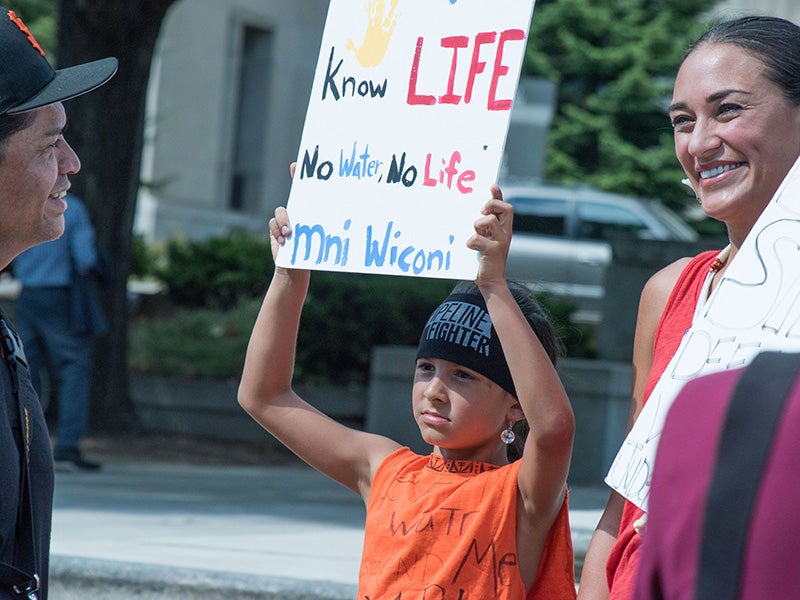DAPL Update: Tribe Asks Court to Shut Down DAPL Due to Failed Remand; Massive Pipeline Expansion Planned
Earthjustice attorney Jan Hasselman explains the significance of the legal development.

The Standing Rock Sioux Tribe’s continuing legal battle against the Dakota Access Pipeline advanced with a motion for summary judgment filed in U.S. District Court in Washington, D.C. The Tribe is asking the Court to shut the pipeline down.
Oral arguments were heard on Mar. 18, 2020. The Court indicated that it would be issuing a ruling in around a week. (Editor’s Note: The decision was issued on Mar. 25, striking down federal permits for the controversial Dakota Access Pipeline. Learn more.)
Jan Hasselman, the lead Earthjustice attorney representing the Standing Rock Sioux Tribe in their lawsuit against the Army Corps, explains the significance of the motion for summary judgment.
What recent legal action did the Tribe take?
The Standing Rock Sioux Tribe remains at risk of an oil spill from the Dakota Access pipeline (DAPL), a major crude oil pipeline that is now operational and crossing the Tribe’s unceded ancestral homelands.
On Aug. 16, 2019, the Tribe filed a motion for summary judgment with the Court essentially asking the judge to resolve the Tribe’s legal challenges to federal permits, and demonstrating why DAPL needs to be shut down until the government has conducted a full-fledged environmental analysis and studied alternative pipeline routes.
In this motion, the Tribe explains how the U.S. Army Corps of Engineers based its conclusions on the risks of an oil spill on hopelessly flawed science, and lays out why the process was inconsistent with laws and policies requiring federal agencies to consult with Indian Tribes when decisions are made that affect their resources.
Standing Rock Sioux Tribe: DAPL Remand Brief (PDF)
Standing Rock Sioux Tribe: DAPL Remand Brief (Text)
What is the “remand”?
In June of 2017, a federal district judge ruled in favor of the Tribe in its lawsuit challenging federal permits for DAPL. The Court found that the Army Corps violated the law when it approved DAPL without fully assessing the Tribe’s expert reports about oil spill risk, considering the environmental justice implications of the pipeline, or assessing the impacts of an oil spill on the Tribe’s Treaty-protected hunting and fishing resources.
The Court “remanded” the issue back to the Corps, directing the agency to conduct further study, and admonishing it to give the issues careful consideration.
Did the Corps follow the Court’s order?
No. The remand process was a sham.
Even though the flaws identified by the Court were matters that required the cultural and technical expertise of the Standing Rock Sioux Tribe, the remand was conducted behind closed doors between DAPL and the Corps.
In fact, evidence uncovered in the litigation revealed that DAPL went so far as to write the Corps’ Remand analysis for them.
DAPL’s draft stated that there was “no new information” needing consideration — even though the Tribe had yet to submit any technical review, comments, or even meet with the Corps.
The Corps never provided the Tribe with the reports it needed, and never considered the Tribe’s extensive technical input.
It was the remand conclusion that the Tribe challenged in Court on Aug. 16, 2019, and that the Court will hear arguments on Mar. 18, 2020.
What happens next?
Now that the Tribe has requested a ruling, the Court will allow the government and pipeline operator to file their own briefs next month. The Tribe will then have a chance to respond. The Court is reviewing information submitted by both sides through November 2019.
At the Mar. 18, 2020, oral arguments, the Court indicated it would be issuing a ruling in around a week.
(Editor’s Note: The decision was issued on Mar. 25, striking down federal permits for the controversial Dakota Access Pipeline. The Court ordered the Corps to prepare a full environmental impact statement on the pipeline, something that the Tribe has sought from the beginning of this controversy. The Court asked the parties to submit additional briefing on the question of whether to shut down the pipeline in the interim. Learn more.)
What is happening with the DAPL expansion?
Even though the existing pipeline is demonstrably unsafe, Dakota Access is nonetheless proposing to double DAPL capacity from 570,000 barrels/day to a stunning 1.1 million barrels a day.
This expansion requires additional approval from the Corps, but the pipeline operator apparently hasn’t sought approval. (Nor is there any indication that the Corps will enforce the law by requiring an application for approval.)
However, the Tribe has requested a hearing from the North Dakota Public Service Commission, where it will demonstrate that expansion is unsafe and places the Tribe at risk.
Standing Rock Sioux Tribe: Request for Hearing, North Dakota PSC (PDF)
Standing Rock Sioux Tribe: Request for Hearing, North Dakota PSC (Text)
Jan Hasselman represented the Standing Rock Sioux Tribe in their lawsuit against the Army Corps. He is a staff attorney at Earthjustice. @JanHasselman